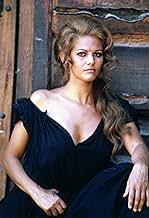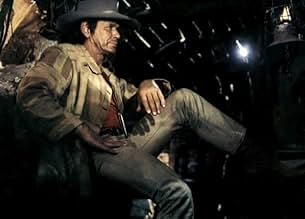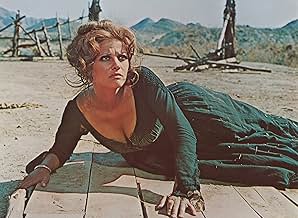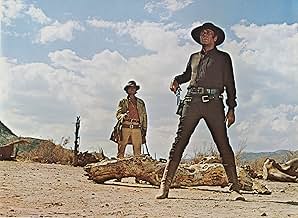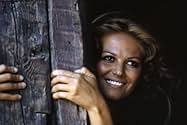Um misterioso estranho se junta com um bandido para proteger a uma viúva.Um misterioso estranho se junta com um bandido para proteger a uma viúva.Um misterioso estranho se junta com um bandido para proteger a uma viúva.
- Direção
- Roteiristas
- Artistas
- Prêmios
- 6 vitórias e 5 indicações no total
Livio Andronico
- Bit part
- (não creditado)
Salvatore Basile
- Member of Cheyenne's Gang
- (não creditado)
Aldo Berti
- Member of Frank's Gang Playing Poker
- (não creditado)
Regina Elena Bisio
- Old Woman in the Tavern
- (não creditado)
Joseph Bradley
- Train Station Master
- (não creditado)
Frank Braña
- Member of Frank's Gang Smoking Pipe at Auction
- (não creditado)
Marilù Carteny
- Mourner at Brett McBain's Funeral
- (não creditado)
Resumo
Reviewers say 'Once Upon a Time in the West' is acclaimed for Sergio Leone's masterful direction, stunning landscapes, and Ennio Morricone's iconic score. Strong performances by Henry Fonda, Charles Bronson, and Claudia Cardinale are highlighted. The film's slow-burning intensity, moral ambiguity, and unforgettable characters cement its status as a classic. Despite some critiques on pacing and length, its artistic depth, complex storytelling, and influence on the Western genre are widely recognized.
Avaliações em destaque
To watch this again after so many years and after so much has changed in movie making, what a joy. The intro scene itself is a work of cinematic genius. Too bad most these days don't have the patience or appreciation for the plot making and cinematography these days. If you appreciate excellent camera work, scene making and soundtrack working together, I can't imagine you would be disappointed in this movie.
It's hard to believe this movie is from 1968. Very modern way of filming for the time. Sergio Leone gave time to each scene... something that new directors seem afraid to do... Great story about the last days of an era. Amazing music and the originality of linking a specific melody to each main character. And all these close-up to character's eyes... Just a wonderful movie.
10daxsir
This is my fav film. It is more like watching a piece of art. The look is fantastic. The director does a perfect job. The acting is wonderful. The story is not the strongest ever but it should be watched to experience it. If your a film lover you can't fail but admire this film.Charles Bronson is the perfect broody loner. Henry Fonda surprises everyone by giving a strong performance as a bad guy. The close up of his eyes is stunning. The camera work and close ups have never been done better. The music is as good as anything you will find in a movie. Throw in the scenes when you first see Henry Fonda. The scene at the railway station which the water dripping on the hat. The sound of the spinning water tower. To me the closet movie to ART i have ever seen and i have seen a lot of films.
I won't go into the story, but it's true, I never tire of this movie---At first i thought Charles Bronson wouldn't be able to keep up with acting heavyweights Henry Fonda and Jason Robards, but Bronson's physical abilities, combined with his minimalist close-ups practically steal the show---His goodness came through in the close-ups toward the movie's end, I thought it was Charles Bronson's greatest screen work.
Once Upon a Time in the West (1968)
On the heels of "The Good, The Bad, and The Ugly," is this equally sprawling and archetypal Western, this time with less obvious dubbing, and Henry Fonda as a kind of tie in to Hollywood's hero paradigm. It's indescribably beautiful, one of the most gorgeous Westerns ever photographed, indeed a model for good visual directing and cinematography in any genre. That alone makes the almost three hours a pure pleasure.
But it's not a fast movie in any other way. It can't be. It depends on lingering over delicious details, small ones, shot up close in startling detail and ever deadpan looks and steely eyes. Nothing is believable and it's not meant to be. It's not even a fable, quite, but more a celebration of being inside an incredible film, as strange as that sounds. Not that the scenes are not believable--even the very last shots of the makeshift town and the railroad being built is about as realistic as it gets. Great stuff.
Plot? You might, at times, wonder where the plot went. There are lots of bad guys, and you're not totally sure there's a protagonist, unless the one woman in the movie is the center of our concerns, even if she is clearly a bystander to it all. When it gets clear, in the last twenty minutes, it's again archetypal (and has echoes of the over the tops showdown in "Good Bad and Ugly"). A small bit of slow motion (not needed normally in a movie where everything is slow already) makes clear this is the key moment in the film, the thing that made the rest of it, with all its confusing and violent layers, sensible.
For my money, I'd love all this incredible visceral stuff, the sounds and sights, filled in with some kind of deeply felt conflict, not a purely dramatic one. I watch and am shocked, or swept away, or impressed, or dazzled, but I'm actually never moved, not from the heart. And there are plenty of aspects here that should really move us--including feeling for the woman's plight, rather than simply recognizing that it is, after all, quite a plight.
Still, another landmark Sergio Leone movie.
On the heels of "The Good, The Bad, and The Ugly," is this equally sprawling and archetypal Western, this time with less obvious dubbing, and Henry Fonda as a kind of tie in to Hollywood's hero paradigm. It's indescribably beautiful, one of the most gorgeous Westerns ever photographed, indeed a model for good visual directing and cinematography in any genre. That alone makes the almost three hours a pure pleasure.
But it's not a fast movie in any other way. It can't be. It depends on lingering over delicious details, small ones, shot up close in startling detail and ever deadpan looks and steely eyes. Nothing is believable and it's not meant to be. It's not even a fable, quite, but more a celebration of being inside an incredible film, as strange as that sounds. Not that the scenes are not believable--even the very last shots of the makeshift town and the railroad being built is about as realistic as it gets. Great stuff.
Plot? You might, at times, wonder where the plot went. There are lots of bad guys, and you're not totally sure there's a protagonist, unless the one woman in the movie is the center of our concerns, even if she is clearly a bystander to it all. When it gets clear, in the last twenty minutes, it's again archetypal (and has echoes of the over the tops showdown in "Good Bad and Ugly"). A small bit of slow motion (not needed normally in a movie where everything is slow already) makes clear this is the key moment in the film, the thing that made the rest of it, with all its confusing and violent layers, sensible.
For my money, I'd love all this incredible visceral stuff, the sounds and sights, filled in with some kind of deeply felt conflict, not a purely dramatic one. I watch and am shocked, or swept away, or impressed, or dazzled, but I'm actually never moved, not from the heart. And there are plenty of aspects here that should really move us--including feeling for the woman's plight, rather than simply recognizing that it is, after all, quite a plight.
Still, another landmark Sergio Leone movie.
Você sabia?
- CuriosidadesHenry Fonda originally turned down the role of Frank. Director Sergio Leone flew to the United States and met with Fonda, who asked why he was wanted for the film. Leone replied, "Picture this: the camera shows a gunman from the waist down pulling his gun and shooting a running child. The camera pans up to the gunman's face and...it's Henry Fonda" (until then, with one exception, Fonda had only been cast in "good guy" roles. Leone wanted the audience to be shocked).
- Erros de gravaçãoAs Frank and his gang ride away from the train, tire tracks are visible in the dirt.
- Cenas durante ou pós-créditosThe opening credits appear over the three gunmen waiting at the train station.
The film title itself appears at the end of the film.
- Versões alternativasFrank's line upon giving Harmonica his namesake varies from version to version. The Italian translates to "play something for your brother," but the most common English version is "keep your loving brother happy," and the German translates to "play me the song of death." The German movie title was inspired by this line.
- Trilhas sonorasDanny Boy
(1913) (uncredited)
Written by by Frederick Edward Weatherly
Hummed and sung a cappella a bit by Simonetta Santaniello
Principais escolhas
Faça login para avaliar e ver a lista de recomendações personalizadas
Detalhes
- Data de lançamento
- Países de origem
- Idiomas
- Também conhecido como
- Erase una vez en el oeste
- Locações de filme
- Empresas de produção
- Consulte mais créditos da empresa na IMDbPro
Bilheteria
- Orçamento
- US$ 5.000.000 (estimativa)
- Faturamento bruto nos EUA e Canadá
- US$ 5.321.508
- Faturamento bruto mundial
- US$ 5.435.312
Contribua para esta página
Sugerir uma alteração ou adicionar conteúdo ausente


